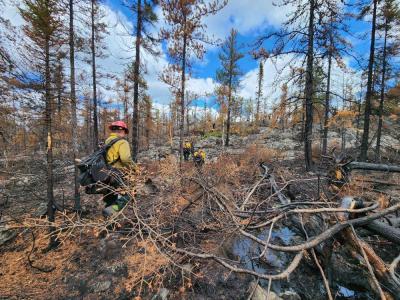MassWildlife firefighter returns from wildfires in Quebec
When Wareham’s Connor Fleming graduated college, he started his career in wildlife biology at a small zoo.
Almost a decade later, Fleming would find himself as a MassWildlife firefighter and in Quebec assisting with the wildfires that began in late April.
In the country’s Northern Zone, there are approximately 48 active fires as of Aug. 1, according to the Société de protection des forêts contre le fe.
The Société reported the fires have burned nearly 3.6 million hectares since the season started.
Therefore, the Department of Conservation and Recreation and Department of Fish and Game commissioners sent Fleming along with 15 other wildland firefighters to Canada on Wednesday, July 5 when more than 70 fires were active.
Fleming said his team had a set schedule they followed every day.
Wake up was at 5:15 a.m.
Breakfast was served at 6 a.m.
By around 7:30 a.m. Fleming and his fellow firefighters would be briefed on the day's work as well as safety.
Then, it was time to head out.
And much to Fleming’s delight, sometimes this meant catching a ride in a helicopter.
“Just seeing the landscape from a bird's eye view — that's the best experience for me at least,” Fleming said.
Prior to this trip, Fleming had never gone on a helicopter.
“That is stuff that a lot of us have not been exposed to yet,” he said. “That's how Canada likes to work with their transportation.”
Fleming added it was a “very unique experience.”
Upon arriving at the worksite on the first day, the differences in the terrain Fleming would be working on became apparent.
“Canada's very boggy,” he said. “The ground is squishy to walk on and very wet as well.”
Fleming said it was quite a different experience to not walk on any hard surfaces.
He added it was important that he and his team remember to keep their boots dry.
He said he and his team stayed in two locations in Quebec. The first site was out west in Normetal and the second was up north in Matagami.
Fleming’s work consisted of searching for what are commonly called “smokes” or heat spots.
“A lot of the areas we were in were already previously burned,” he said. “They asked us to go into these areas and make sure there was no heat — just in case the area dried out and spread and just to make sure that there was no potential of reigniting.”
Between 4 p.m. and 5 p.m. the crew would call it a day and head back for dinner at 7 p.m.
Then, it was off to bed.
“There were a lot of good training experiences to bring back to the state,” he said, “whether we're working with medical incidents that happen or just learning new techniques or the way Quebec fights fire.”
Fleming said, “That's probably the most important thing that's come out of this.”
Though he won’t necessarily be doing it anytime soon in the U.S., Fleming said he enjoyed the experience of becoming more comfortable with using the equipment needed to do bucket drops from a helicopter in the places that were harder to reach.
“It's pretty cool,” he said.
On Saturday, July 22, the crew arrived back in Massachusetts.
Fleming said he enjoyed the work, but is glad to be back home.
He added he is happy to know that “if anything were to happen in this state, Quebec would come and help us out, too.”



.jpg)










